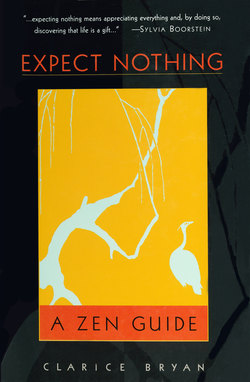Читать книгу Expect Nothing - Clarice Bryan - Страница 10
ОглавлениеINTRODUCTION
How do we act in the world? How do we call forth the world without harming ourselves, other people and the world itself? How do we carry as little baggage as possible into each moment, and accumulate as little baggage as possible in each moment? How do we enter into each moment of the present with a clear conscience and a clear consciousness, gently holding and realizing the world and our life?
Richard Baker*
I’m just a beginning Buddhist, but in trying to grasp the meaning of not grasping, I have found an intermediate step of not expecting. Seek and ye shall find ... ask and it shall be given—more and more expectations everywhere you look. I have spent much of my life being distracted by what could be.
I have been the great expecter!
Putting expectations on myself is one thing, but putting expectations on others is a travesty. I burden someone else with my needs for their behavior. I create unneeded and usually unwanted goals for others and then expect them to understand my disappointment and sometimes my anger when they don’t live up to my goals. It is really my expectations that fail, not the other people, but, of course, I blame them.
I have been a rabid perfectionist most of my life. I practiced perfection. I expected everything I did to be perfect, and I expected everything everyone else did to be perfect—by my standards of perfection, of course, not theirs.
Slowly, I am learning that people are different—especially that they are different from me. They have different time concepts, different food preferences, different religions, different cultural behaviors, different politics, and talents, and philosophies.
One of my own philosophical differences is that I happen to agree with the teachings of Buddhism. A friend once said it takes years to put one’s philosophical beliefs into action. Putting my beliefs into action is what I am working on here.
Certainly it is through our actions that we are known. But do we act the way we are or the way someone expects us to act?
Act like a woman. Act like a man. Act like an adult. Act like a professional. Pretend to be something others expect you to be, even if you’re not.
Usually these are the rules of society. Sometimes they are someone else’s idiosyncratic expectations.
As living beings, we have been given so many miracles, yet we seem to continue to expect more and more of ourselves, of everyone else, and of the planet.
Writing this manuscript is one way for me to come to terms with the knowledge and principles of the Buddhist discipline. This is a philosophy that brings me peace and joy, and I hope to share it with others. I believe that we can live better if we expect less in every aspect of our lives.
It doesn’t matter what you’ve been given, whether it’s physical deformity or enormous wealth or poverty, beauty or ugliness, mental stability or mental instability, life in the middle of a madhouse or life in the middle of a peaceful silent desert. Whatever you’re given can wake you up or put you to sleep. That’s the challenge of now: what are you going to do with what you have already—your body, your speech, your mind?
Pema Chodron
